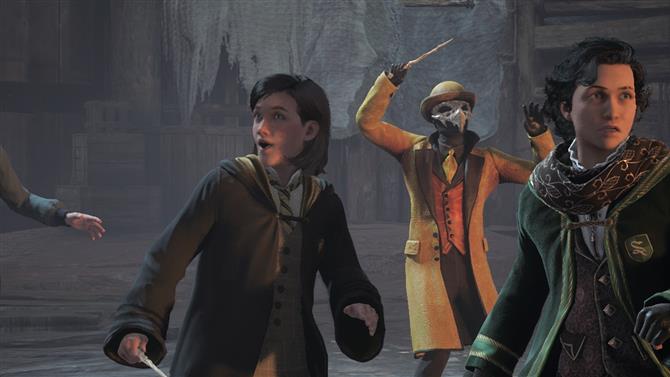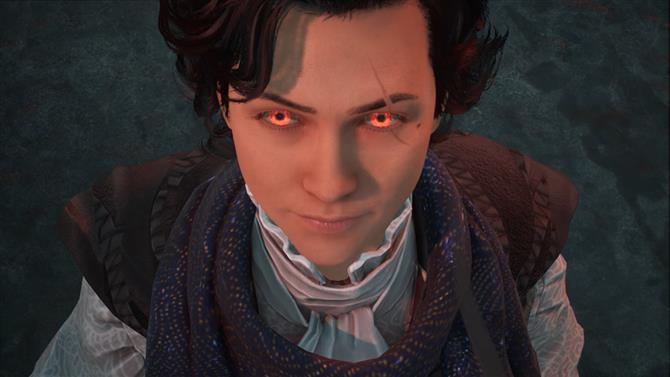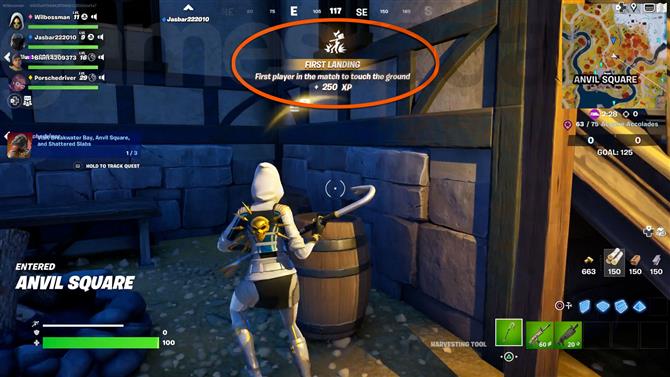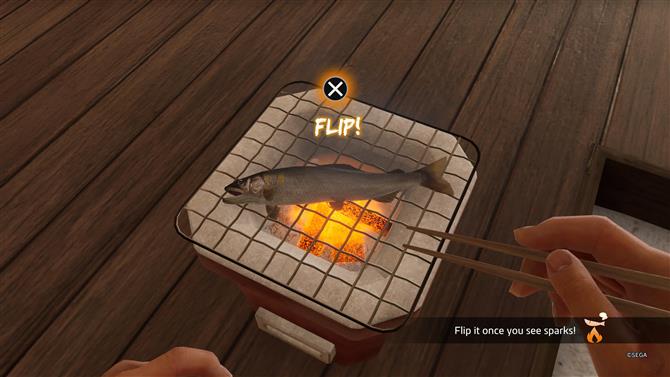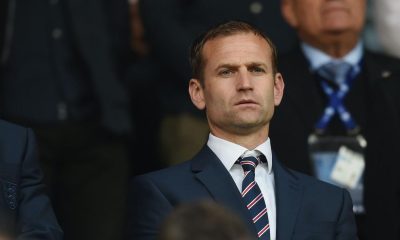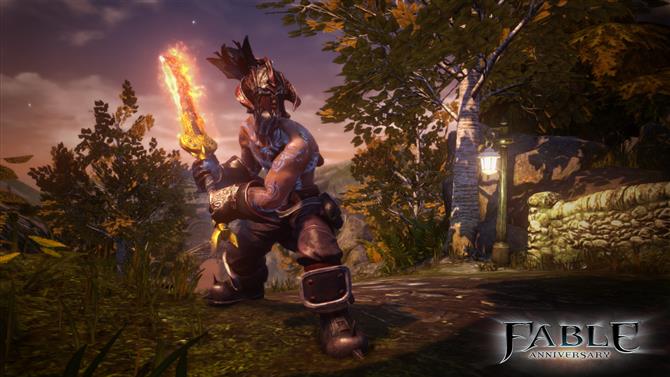
Hogwarts Legacy could learn a lesson from Fable’s morality system
Follow Us @
Hogwarts Legacy could learn a lesson from Fable’s morality system
“Right,” the lady regrets in a broad Lancastrian accent, as my little hero tells her of her fabled husband’s infidelity. “I’ll turn you into Balverine food!”
As she thanks me for my kindness and marches uphill to give her partner a good cheer, some text on the screen appears to inform me that I’ve just performed my first good deed in giving an unfaithful husband. It’s an action that nudged my moral compass ever so slightly in the direction of good and virtuous, something that will be a constant push and pull during my time in the fable, as my actions manifest consequences.
20 years later, in the legacy of Hogwarts, there are no such consequences to be seen. I’m obnoxious to my peers, liberal with my use of unforgivable curses, and I do my absolute best to be awful, even if the game won’t let me be mean. Fable might seem like a damned less-than-flashy vision, but it’s obvious: the lack of a morality system is a wound to Hogwarts’ legacy, and that’s what makes Fable memorable even today.
Judgment Day
(Image credit: Lionhead) Peace of the Companion
(Image credit: Avalanche software)
Hogwarts Legacy Missed a Trick for Not Doing More With Its Companions
The absence of a morality system in Hogwarts Legacy, an RPG where you can actually learn dark magic and use it against your enemies, is no accident. When we sat down with narrative director Moira Squier and lead designer Kelly Rowland, they told us “this was important because it comes from a place of non-judgmental game makers.” But why did they equate authentic and in-game consequences with developer judgment against player? This is certainly not the case with Fable.
As I set out to explore the Kingdom of Albion for the first time, as someone pushing 30, I understood why Fable is still admired to this day. With every decision in the game holding the power to influence you from good to bad, there’s an undeniable weight to every moment. Should you fight for the bandits against the people of Orchard Farm (after all, villagers are much easier to kill than bandits), or will you do well for the hero’s guild? The choice is yours, but the ramifications of your actions are left simple. That said, the game doesn’t judge you for your actions so much as it opens up a whole new path for you to fully lean into the kind of hero you want to be.
In the fable, as you accumulate your reputation as good, bad, or neutral, your appearance also changes. Those of a good alignment will find themselves sprouting angelic blonde hair while their eyes turn azure blue. On the other hand, those adamant of treading the path of evil must expect horns to grow from their foreheads, their hair to darken, and eyes to burn red in their sockets. Sure, there’s something uniquely uncomfortable about Aryan promises to play a nice guy, but I like the concept of moralistic consequences that stretch to include not just how the villagers respond to you, but what you actually look like. It’s a visual representation of where you are in the eyes of your peers, meaning how they see you in the game world – and despite what the Hogwarts Legacy team might have feared, I don’t think the developer at Fable Lioad Studios is judging us a little. After all, we are evil because we choose to be, so this is very much about us.
Not that Fable’s morality system is perfect. As you spend skill points to grow your young hero and watch your character model transform, you get wrinkled and old and struggle to push yourself. There are ways to reverse the aging process, such as sacrificing villagers or even your own wife in Skorm’s chapel. This is actually less bad in the game than divorcing your wife or husband, which sounds bizarre, but hey: it’s medieval times, and the fact that you can divorce them is pretty progressive when you think about it. Kind of. Perhaps things will look a little different in Fable 4, but I certainly hope that developer playground games stay true to their robust morality system.
It’s my game and I’ll be mean if I want to
(Image credit: Avalanche software)
We’re bad because we choose to be, so that’s a lot about us.
Two decades and a good deal of technological advancement later, Hogwarts Legacy made its debut. The magical RPG takes us back in time to pre-patter Hogwarts, allowing us to create our own character, learn spells at school and unravel a mysterious story in the process. But as awesome as the world is to explore, something about Hogwarts Legacy feels flat and false. Until I picked up Fable for the first time, I couldn’t figure out why.
When it comes to the use of magic in combat, Hogwarts Legacy clearly trumps Fable. But wait a second, do my teachers really not respond when I try Avada Kedavra, a workout, right next to them? Am I really going to be released for casting an unforgivable curse on school grounds with little more than a stern warning from Madam Kogawa? Yes indeed, because as Squier and Rowland told us in our Hogwarts Legacy preview, “We don’t have a system of morality that punishes (the player) for doing so”.
If that had happened in Fable, I probably would have lost about 100 reputation points and fallen hard on the evil side of the tracks. A gruff guard would have called me out on this, the villagers would have panicked, and I would have ended up answering for my crimes one way or another. Afraid of our frustration at knowing we’re behaving badly, the Avalanche software has essentially created a world where nothing really matters because you’re so powerful. The rules apply to everyone else in the Hogwarts legacy except you, because you’re a magical teenager with access to ancient powers and that’s apparently enough to give you a free pass to be an idiot forever.
You can’t help but feel like the game is holding you in one arm for fear of causing upset, and your immersion factor suffers as a consequence. As Josh West of GamesRadar said in his review of Hogwarts Legacy, “the lack of any reasonable reaction to his actions further erodes any essence of the dramatization”. I never thought I’d be begging for detention, but here we are. There’s so much potential for an intuitive morality system in the Hogwarts legacy that I can only hope Avalanche pulls a leaf out of the Fable book when it comes to creating some DLC.
Here are some more games like Hogwarts Legacy for a witching time.
Hogwarts Legacy could learn a lesson from Fable’s morality system
Follow TodaysGist on Google News and receive alerts for the main news about celebrities, soap operas, series, entertainment and more!
FIRST REACTION FROM A READER
For More On “Gist’s today” Enjoy Hot air news
Be the first to leave us a comment down below in the comment section. click on subscribe button to get firsthand daily updates, filled with amazing USA today entertainment, hot trending news, story trend, gist’s, black celebrities kid news and gossips, tech trend, Relationship guides, opportunities to make money online, new trends in marketing and lots more.
CONTINUE WITH US ON SOCIAL MEDIA: << FACEBOOK >> | << WHATSAPP >> | << TWITTER
>>
Hogwarts Legacy could learn a lesson from Fable’s morality system
#Hogwarts #Legacy #learn #lesson #Fables #morality #system
-
Cryptocurrency2 months ago
NFT Sales Touch IDR 4.3 Trillion in the Second Week of February 2024
-
Sports2 months ago
Making history at the 2023 Asian Cup, the Indonesian national team raises its position in the FIFA rankings
-
Sports2 months ago
PSG Will Try to Sign Frenkie De Jong from Barcelona
-
Sports2 months ago
Falling from Bilbao, Girona's position is threatened in the Spanish League
-
usa today entertainment2 months ago
Adu Outfit Park Min Young Becomes an Office Worker, from Drakor What's Wrong with Secretary Kim to Marry My Husband
-
Trend tech & Telecoms2 months ago
28 Terrorist Group Accounts Get Paid Blue Check on X
-
Sports2 months ago
And Ashworth Urges Manchester United to Seize an Important Figure at Chelsea
-
Sports2 months ago
Lukaku Calls Draw Away Good Results









